Medical negligence cases benefited from pragmatic collaboration by all involved during the pandemic. Politicians intent on reforming the handling of disputes which arise from clinical failings should take note. Eduardo Reyes reports from the latest Gazette roundtable
At the table
(From bottom, clockwise)
Eduardo Reyes Law Society Gazette
Mike Knight ARAG
Catherine Bennett Capsticks
Hector Stamboulieh ARAG
Vinod Kathuria Tula Medical Experts
John White Enable Law
Simon Hammond NHS Resolution (on screen)
Beth Heath Lanyon Bowdler (on screen)
Daniel Gilbert Law Society
Suzanne Trask Bolt Burdon Kemp
John Hyde Law Society Gazette
Paul Rumley Society of Clinical Injury Lawyers
Anne Kavanagh Irwin Mitchell
When viewed through a political lens, it seems obvious that money spent on legal fees and claims against the NHS is a problem. The £2.2bn bill for 2020/21, of which £433m comprised legal costs, represents ‘a significant burden on the NHS’, according to the government. Neither is the tendency to park the blame at the door of the lawyers involved limited to Conservative lawmakers and commentators. Guardian columnist Polly Toynbee writes confidently of ‘the kinds of firms that urge people to sue the NHS, soliciting online, in TV ads or posters in waiting rooms’.
It does not seem to matter that it takes an act of brazen conflation to lump together claims management companies with the experienced solicitors who act for claimants and defendants in complex medical claims. The analysis that places lawyers at the centre of the NHS’s disputes woes has a huge following in politics and the media.
In the weeks leading up to this roundtable discussion, the Commons health and social care committee published a report proposing an ‘administrative scheme’ to replace a litigation system that is ‘not fit for purpose’. The committee’s chair, Jeremy Hunt MP, a former health secretary, has also published a book, Zero: Eliminating Preventable Harm in the NHS. Hunt argues that in an ‘adversarial’ system, mistakes are not learned from in time to prevent future harm.
And the Department of Health and Social Care is listening. Earlier this year, the department held a consultation on introducing fixed recoverable costs for lower-value clinical negligence claims. It has said it will consult on ‘next steps’ to address the costs of clinical negligence, and has hinted that the cost of maternity cases is a central focus.
This view of claimant and defendant lawyers deliberately stringing out litigation to maximise fee income is as cliched as it is wrong. Evidence of that begins with the response those present had to the challenge of keeping cases going during the pandemic lockdowns and restrictions.
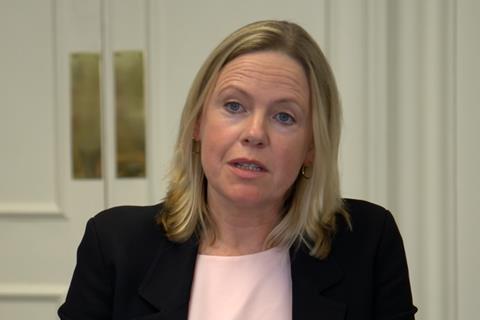
Catherine Bennett, partner at defendant firm Capsticks, says the practical challenges of the pandemic produced delays, but adds: ‘There’s also a great deal of positivity to come out of the Covid protocol.’ The protocol, drawn up by key stakeholders including claimant and defendant solicitors, the Law Society and the Bar Council was, she recalls, ‘drafted with a view to pushing cases along as far as we could during the pandemic and I think it’s really heightened collaboration… that’s a real positive step.
‘We were collaborative before, I’d like to think,’ she adds, ‘but [the protocol] has really sped that up. So, while there is delay, I think we do need to hang on to those positive bits in the protocol and work together to keep those in practice.’
‘I completely agree,’ Paul Rumley, chair of the Society of Clinical Injury Lawyers, responds. The protocol, he says, was ‘an absolute epitome of the collaboration that we need, and we need to continue that going forward’.
‘I thought the collaborative working was a real success,’ Enable Law partner John White, a one-time NHS doctor confirms. ‘My own impression is that that atmosphere’s continued since the pandemic.’
That collaboration went beyond the use of the protocol, Irwin Mitchell partner Anne Kavanagh says, ‘to include the use of mediation’ and a ‘variety of different mechanisms to try to reach a resolution in the face of perhaps delays with the form of the court process.
‘I think that was really positive,’ she adds. ‘I hope that continues.’
In attendance via video-link is Simon Hammond, director of claims management at NHS Resolution, the arms-length body that deals with clin neg disputes. I ask him if there will be an effort to capture and apply the lessons of such pandemic arrangements through a review.
‘From our perspective,’ he says, ‘it’s been really pleasing to see. Something that we really believe in is taking the adversarial approach out of the process – so that actually we get to a resolution.
‘I think there are opportunities that have come out of the pandemic that may not have presented themselves [otherwise],’ he adds. Hammond cites remote consultations, virtual mediations, virtual settlement meetings, and, by ‘removing travel’, making it possible ‘for healthcare professionals to go to mediations without losing clinical time at the front line’.
'I think that blame culture is actually slowly dying [out] because people are being supported more within the department and within the hospital'
Vinod Kathuria, Tula Medical Experts
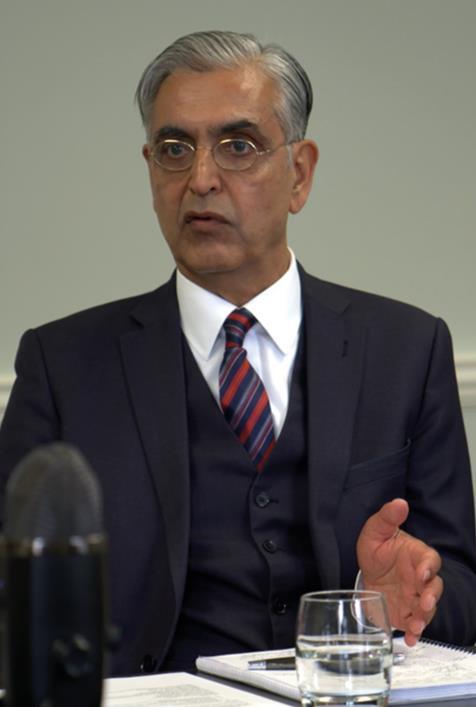
But reasonable claimant and defence lawyers are also reliant on the approach of NHS trusts and the courts. As Rumley notes: ‘There’s been a huge slowdown in the progress of clinical negligence cases during the course of the pandemic.’ This he attributes to ‘a combination of delays… in obtaining records, obtaining expert reports, but also court backlogs, especially at the Royal Courts of Justice here in London… we’re experiencing severe delays with getting hearings, getting documents out of the masters, even though we’ve got the specialist masters here in London. But, I’ve also noticed more cases being defended, which is going to have an implication for cost figures.’
Beth Heath, partner at Lanyon Bowdler, relates her experience of the courts in Birmingham. ‘We’re having awful troubles with Birmingham and the delays are phenomenal,’ she says. ‘It’s taking me 15 months to get an approval hearing. It’s 12 months to get to [case management conferences]. And even on cases where we are getting hearings, I think the courts are just exacerbating costs rather than looking at the bigger picture.’ Courts, she says, are demanding CMCs even in cases where both sides are in ‘full agreement on directions’.
Court conduct is a contributing factor to the backlog in cases. In that context, Heath says: ‘The collaborative approach that we’re seeing, it’s really impressive and I just hope that it continues throughout the cases, because we’ve got a large number to get through.’
'Being in a trial that was a hybrid setting, it was rather difficult to hear expert evidence'
Suzanne Trask, Bolt Burdon Kemp
What else would the lawyers present retain from the practices established during the pandemic?
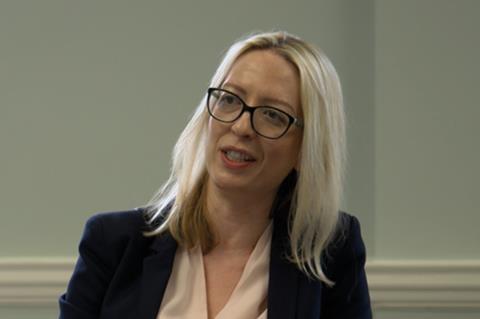
‘Mediation is a big prospect for development,’ is Bolt Burdon Kemp partner Suzanne Trask’s assessment. Mediation is not restricted by court directions and is also able to make use of remote technology, she adds. But Trask, who is vice president of the Association of Personal Injury Lawyers, found some technical improvisations less satisfactory. ‘I have mixed experiences of court hearings by video and in hybrid settings,’ she says. ‘Being in a trial that was a hybrid setting, it was rather difficult to hear expert evidence.’
Vinod Kathuria, an orthopaedic surgeon and clinical lead on the Tula Medical Experts panel, relates a mixed experience of being an expert witness. Giving evidence remotely, he says, ‘felt comfortable in our own environment. Giving the evidence virtually, we felt slightly more confident…experts felt more at ease’.
It would have taken longer to get appointments without remote options, he adds. That was important, because the sheer number of his colleagues involved in frontline activities meant ‘a smaller bank of people who were available to be experts at that time. They had to prioritise’.
In future, though, he foresees some unsatisfactory scenarios: ‘If there was a joint conference and one expert had actually seen the patient and the other one had done a remote consultation, then one may have the edge over the other.’
Litigation and learning
Jeremy Hunt MP, chair of the Commons health and social care committee, argues that an adversarial system prevents lessons being learned and applied following incidences of medical negligence. That is contested by roundtable attendees.
‘You need the facts, you need the claims,’ Capsticks partner Catherine Bennett argues. ‘You need to learn from those.’
NHS Resolution’s Simon Hammond says: ‘When we are receiving claims which are three years old, four years old, there is a limitation on what you can then take from that. We try and encourage trusts to consider their cases, where they have high volume or high value especially, when it looks [as if] there may be repeat conditions or repeat mistakes being made. We also look at thematic reviews; a more in-depth look, to produce best practice guides and leaflets for the service.’
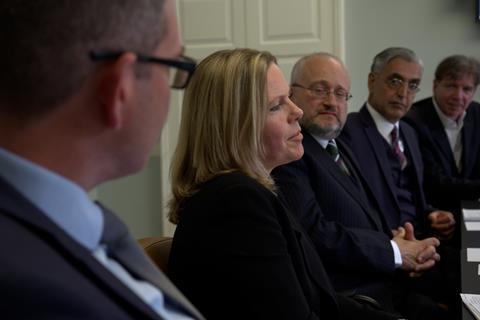
Lanyon Bowdler partner Beth Heath points to problems with ‘culture’ that do not have a direct relationship with cases. Alluding to reports based on investigations into failings in maternity services at Morecambe Bay (2015) and Shrewsbury and Telford (2022), she notes: ‘The similarities are astounding.’
‘A separate part of the process is needed to deal with this learning,’ Enable Law partner John White suggests, adding that this ‘shouldn’t be something that detracts from’ claims.
‘I think things are changing,’ orthopaedic surgeon Vinod Kathuria observes. ‘Blame culture is actually slowly dying [out] because people are being supported more within the department and within the hospital.’
But dissemination of lessons learned remains a problem, he says: ‘Not many people are learning from other people’s mistakes. Unless we try and do that and focus on patient safety, and disseminate all the lessons learned in a very structured way throughout the NHS, the number of claims will not go down. Because, [while] I will not make the mistake again, somebody else in another hospital is going to do the same thing.’
Costs
Attempts to address the predictability and level of costs in civil cases have had an effect in medical negligence, but the impact is mixed, those present report. The discussion turns to the demands of costs budgeting.
‘It’s a double-edged sword,’ Trask explains. ‘In one sense it provides certainty of outcome and predictability, but that relies upon getting the right budget at the right place… The actual cost of budgeting itself is not insignificant; we do find ourselves returning to the court for hearings just [for] updating budgets.’
One problem, she adds, is that clients she works with, including vulnerable adults, have ‘changing needs’.
Rumley adds: ‘I think the whole push for more being done for less cost has its limits, in particular in more complex cases where the clients don’t have capacity.’
‘I am all for costs budgeting,’ Bennett replies. ‘I think it’s very sensible and it does provide certainty. I appreciate what you say about… having to divert resource into… the whole process, but I do think the benefits of getting certainty, particularly on the high-value cases, from a dependant’s perspective, is something really, really helpful to us.’
Again, the capabilities of the courts are a consideration here. Kavanagh says her own cases mostly involve masters with specialist knowledge. ‘My experience is that they tend to take a pragmatic approach,’ she says. But she adds: ‘We have some colleagues around the country who are dealing with district registries,’ where there is a ‘variation in approach’.
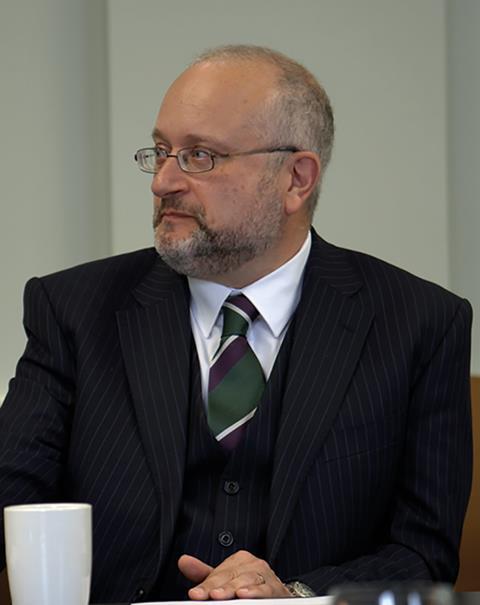
‘It’s the lottery in terms of the judges that you can get,’ Heath confirms. ‘While there are some very well-respected judges, there are some that perhaps are hearing clinical negligence cases who shouldn’t be, because they don’t have the required expertise or experience to do so.’ When it comes to budgeting, she adds: ‘If you get a bad pick in the lottery… it can be an awful day from a claimant’s perspective.’
For legal expenses insurer ARAG, in-house lawyer Hector Stamboulieh says: ‘From a legal expenses point of view, on paper we like budgeting, although I fully appreciate the difficulties that claimants have. What you’ve got is a moving target. In theory it means you’ve got to think of every possible scenario and try and fit it in.’ This notwithstanding, he says: ‘It gives us a rough idea… the same as the defendants who like to have a rough idea of what they’re facing.’
The government could go much further and the discussion turns to the prospect of fixed recoverable costs being introduced in medical negligence cases – the subject of a consultation earlier this year. Rumley notes that proposals outlined in the consultation would fix the cost of legal advice, but not the costs of experts. ‘Fixed costs doesn’t touch the expert fees and it’s one of the massive holes in the proposal,’ he says. ‘If you fix costs but you don’t fix the expert costs – you haven’t fixed costs.’
‘What is curious about the government’s approach across budgeting,’ Gazette deputy news editor John Hyde adds, ‘is they don’t seem willing to pat themselves on the back and actually acknowledge the success of it. Claimant costs have come down. The NHS reports regularly say so. Of course, budgeting is obviously very difficult from the practitioner’s point of view, but it has worked in that respect’.
The major flaw in policymakers’ approaches to tackling the NHS’s litigation bill, Rumley argues, is the assumption that reforming litigation is an end in itself. ‘Why is there still so much negligence in the NHS?’ he asks. Referencing annual litigation costs (which include damages payments), Rumley says: ‘We need to put it into context – £2.2bn a year. That is a lot of money, but it has to be set against £150bn each year being put into the NHS. That’s an equivalent insurance risk rating of 1.3%. In professional services, which is the closest comparator, the average is 7%-8%, so this isn’t running away with itself.’
'To say that safety and learning within the NHS is impossible because we work in an adversarial system is something that I take great issue with'
Catherine Bennett, Capsticks
Fixed costs would fail to deliver savings, Rumley argues, because claimant lawyers may cease work on filtering out claims with a poor prospect of success at an early stage. ‘We filter out 90% of the claims free of charge,’ he notes. Without that work, cases involving litigants in person will proceed further, draining resources.
‘There is a false narrative out there, which is unfair,’ Capsticks’ Bennett says. She references the statistics used to criticise medical negligence claims, including ‘that it takes 11.1 years to resolve a high-value claim.
‘That might be the average for brain-damage baby cases,’ she says. ‘But actually, across the portfolio of cases we have… the average is something like 1.69 years. So, if you look at all the cases as a whole, the shelf-life is really pretty good. We are achieving resolution with the current system.’ As a result, Bennett concludes: ‘To say that safety and learning within the NHS is impossible because we work in an adversarial system is something that I take great issue with.’
Another proposal from the health and social care committee is the creation of an independent ‘administrative body’ to process and determine claims. That would be an enormous undertaking, White points out. ‘There’s going to be a lot of cost in that as well.’ He believes the result could be an increase in insurance premiums, and points out that claimants would still have recourse to litigation.
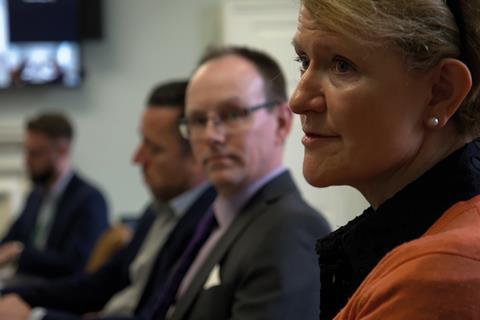
A system of ‘no-fault’ compensation is a proposal that has long been discussed. Could it sit alongside a ‘duty of candour’ to establish a better culture of learning from mistakes in the NHS? The airline industry’s safety culture is held up as an example in this regard.
‘I hear this proposal to compare us with the airline industry all the time,’ Kavanagh, a former nurse, says. ‘Airlines don’t take off without a full crew, and we know that one of the biggest challenges is workforce in the NHS.’
In Bennett’s assessment: ‘A no-fault system will just encourage people to make claims. I think the affordability issue would be huge… people would try their luck… I think it’s unworkable.’
ARAG’s Mike Knight suggests there are lessons he can draw as an ATE insurer from previous litigation reforms in other areas of claim, which were aimed at controlling costs. The result was, ‘the same amount of winners, but more cases from firms trying to move into that space’.
Instead, White concludes, there is merit in ‘a system which rewards experienced people operating within it’.
Photographs by ARAG/Ross James
- This roundtable discussion was kindly sponsored by ARAG and Tula Medical Experts
Read Eduardo Reyes' blog on bringing clinical negligence claims here.























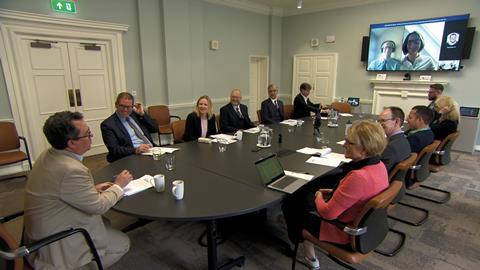













1 Reader's comment